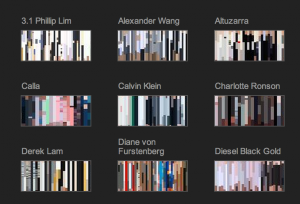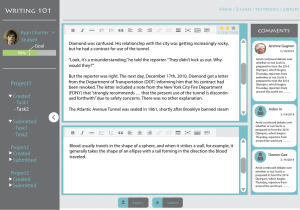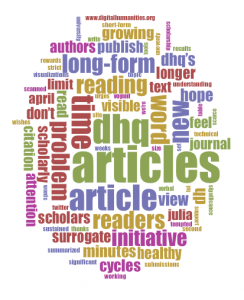Last week I was at a great little conference, the International Ethics Roundtable 2014. My conference notes are at Information Ethics And Global Citizenship. I gave a paper titled, “Watching Olympia”, about the CSEC slides that showed the Olympia system developed by the Communications Security Establishment Canada. You can see the blog entry that my paper came from here.
Research Data Management Week
This week the University of Alberta is running a Research Data Management Week. They have sessions throughout the week. I will be presenting on “Weaving Data Management into Your Research.” The need for discussions around research data management is described on the web page:
New norms and practices are developing around the management of research data. Canada’s research councils are discussing the introduction of data management plans within their application processes. The University of Alberta’s Research Policy now addresses the stewardship of research records, with an emphasis on the long-term preservation of data. An increasing number of scholarly journals are requiring authors to provide access to the data behind their submissions for publication. Data repositories are being established in domains and institutions to support the sharing and preservation of data. The series of talks and workshops that have been organized will help you better prepare for this emerging global research data ecosystem.
The University now has language in the Research Policy that the University will:
Ensure that principles of stewardship are applied to research records, protecting the integrity of the assets.
The Research Records Stewardship Guidance Procedure then identifies concrete responsibilities of researchers.
These policies and the larger issue of information stewardship have become important to infrastructure. See my blog entry about the TC3+ document on Capitalizing on Big Data.
The DH Experience Game on Vimeo
We have put up a video of the The DH Experience Game on Vimeo in the INKE Vimeo channel.
John Montague and Luciano Frizzera have designed a cool game that allows people to play at collaboratively completing digital humanities projects. We are now working with GO::DH to make the centers and projects real ones from around the world.
cyoa
cyoa is a great essay/visualization/animation about Choose Your Own Adventure books. There are visualizations of the choices and some great animations of the flow of choices.
The whole essay/site is beautifully designed (and it has a colophon.) It is gesture of love towards Choose Your Own Adventures.
Fragmented Memory | Phillip Stearns
From Elijah Meeks’ hackathon at the Texas Digital Humanities Conference I learned about Fragmented Memory by Phillip Stearns. This is a project that takes binary data and then turns it into weaving instructions using Processing. Here is one of the large tapestries woven (and available for sale.)
If you can’t afford a $15,000 tapestry, there are also cheaper blankets here.
I’ve just put them on my Christmas list (which I can never find in time.)
1st Inaugural Texas Digital Humanities Conference
I’m here at the 1st Inaugural Texas Digital Humanities Conference/a> at the University of Houston and keeping my conference notes here. One of the threads of the conference is network analysis and the other is collaboration. I stuck to the network stream and have been swimming in interesting visual ideas and concepts.
Front Row to Fashion Week – NYTimes.com
The New York Times has an interesting way of visualizing fashion that you can see in their article Front Row to Fashion Week – Interactive Feature. They have abstracted the colour hues to create small swatches of different designers who showed at the New York Fashion Week. These “sparklines” or sparkboxes are an interesting way to compare the shows by designers.
Eyes in Joyce
I’m giving a talk on Hermeneutica: In Praise of Small Interpretations at the University of Houston at the 1st Inaugural Texas Digital Humanities Conference. One of the things I’m showing is the embedding of Voyant hermeneutica like this one.
Blended Learning Award for GWrit
The Game of Writing (Gwrit) project that I am part of just got support through a University of Alberta Blended Learning Award. See the 2014 Selected Courses. This award is going towards creating a flipped version of Writing 101, a service course that is being scaled up to support large sections by Roger Graves and Heather Graves. With the Blended Learning Award support from the Centre for Teaching and Learning and with Faculty of Arts funding we are redeveloping GWrit to be used in large sections of Writing 101. Here is part of the abstract of the proposal,
Research suggests that by creating a rich online environment for students to connect and interact with instructors and peers they can improve as writers. We are currently building a gamified online writing environment, The Game of Writing (GWrit), for Writing Studies 101 (WRS 101) that can support student writers and alumni. WRS 101 is a high demand service course required for many degree programs across the University. We are creating a large class version that blends face-to-face with gamification strategies. In GWrit students will choose and work on assignments or quests that are part of the course. Their progress on these assignments or quests will be shared with peers and instructional staff; in this way all students can see who is working on the same quests, and they can ask for help or advice from them. Informal assessment will be available online from peers in the class; from paid peer tutors; from GTAs; and from alumni. This represents a significant expansion of the informal assessment available in traditional face-to-face courses, where peers and sometimes the instructor give informal feedback. We also intend to invite alumni to post assignments/quests that come from a workplace writing context. Students who complete WRS 101 will continue to have access to GWrit throughout their undergraduate careers and as alumni.
GWrit started as a prototype developed with support from GRAND. The original idea was an open writing environment where folks could challenge each other to compete at writing and where you could get analytics on your writing (number of words written, tasks completed, and visualizations like word clouds.) This research prototype is now being completely redeveloped by the Arts Resource Centre as a learning tool that can be used by students of our courses. We are adding commenting features so that students (and later alumni) can provide writing guidance in a structured fashion.
Digital Humanities Quarterly: April Fools 2014
Julia Flanders, Editor in Chief of DHQ, played a great joke on all of us for April Fools. She sent around a message that started with,
DHQ is pleased to announce an experimental new publication initiative that may be of interest to members of the DH and TEI community. As of April 1, we will no longer publish scholarly articles in verbal form. Instead, articles will be processed through Voyant Tools and summarized as a set of visualizations which will be published as a surrogate for the article. The full text of the article will be archived and will be made available to researchers upon request, with a cooling-off period of 8 weeks. Working with a combination of word clouds, word frequency charts, topic modeling, and citation networks, readers will be able to gain an essential understanding of the content and significance of the article without having to read it in full.
On April 1st, 2014, if you went to Digital Humanities Quarterly: 2014 you would have been able to access Voyant versions of the papers of the recent that are there. Stephen Davis on the TEI list logically took it a step further and wrote that he had processed the message itself through Voyant and that the “derived Cirrus word cloud really does say as much (as) anyone need to know about DHQ’s new approach!” Alas the word cloud wasn’t included, so I generated one and here it is.
What else is there to say?




